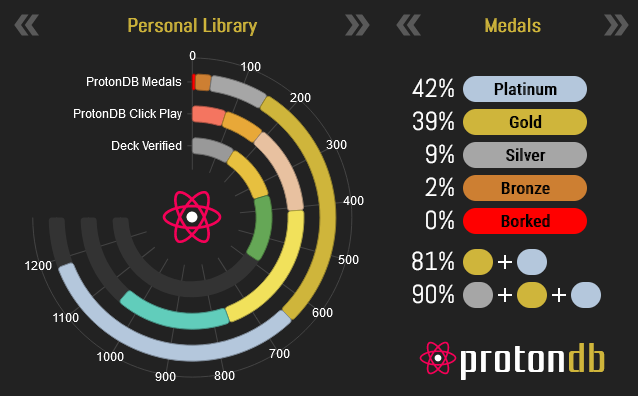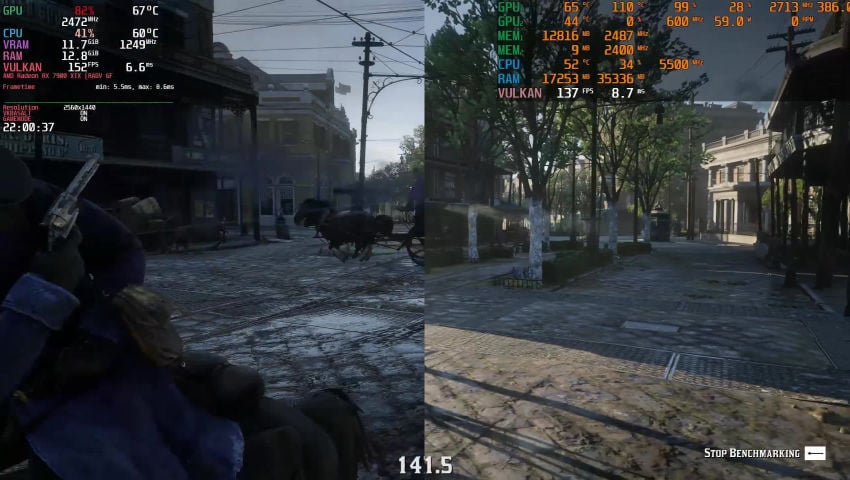- cross-posted to:
- linux@lemmy.ml
- cross-posted to:
- linux@lemmy.ml
Is it linux is faster, or is it dxvk/vulkan is faster?
Could be both. Who knows. For high performance computing Linux is the de facto standard because it has better performances than windows, and Linux distros are usually better, stabler OSes overall when one needs raw performances. In this case, who knows, someone should investigate further
deleted by creator
Hey now! Starships aren’t nearly as complicated!
deleted by creator
Tbf, on Linux performances for hpc are better even on standard desktop distros, no need to clean it up. It manages resources and jobs much better. For performances that is the critical part, once the code is optimized.
I think it has more to do with Linux being easier to tweak, not some inherent performance difference. You can tweak the scheduler, page sizes, and all manner of other things to get a bit more performance if you know what your workload looks like. So it being open source and ubiquitous is a bigger contributor imo than anything inherent to the design of the kernel.
Regular users aren’t going to go through that level of tweaking, so the difference should be a lot smaller and will benefit more from general code-level optimizations than system tweaks. General purpose, high performance computing works just fine on Windows, it’s just easier to tweak Linux for production compute use cases.
No no, it is better. Take a real hpc library, install debian and test it yourself. No tweak needed. Linux as kernel and the overall OS manages resources much better. Linux is a better kernel than windows kernel.
I’ve been doing hpc for over 15 years now. People install standard distros on their workstations and clusters. No tweak needed
How big are we talking? I looked and couldn’t find benchmarks, but then again I’m not familiar enough with HPC to know what benchmarks to look for.
I’ve been Linux exclusive for something like 15 years now (before Steam even came to Linux), so I’m not exactly familiar with Windows performance on the stuff I use. I casually look at larger projects and benchmarks they run (for example, I remember async on Linux vs Windows was a significant issue in the early days of node.js).
I do dabble a bit in hpc, but only on Windows and macOS. I’ve done signal processing and some high thread count number crunching, but I haven’t needed to run benchmarks, just get things running well enough (as in, minutes vs hours, not 10-20% difference).
When I talk about hpc, I don’t talk about a script in Matlab. I talk about the work you do on supercomputers, real computing intensive jobs that takes weeks or months on hundreds or thousands of processors. I guess you don’t find benchmarks simply because no one uses windows, same reason you probably don’t find a fiat panda in the Nürburgring rankings.
K. Everything I’ve done is basically translating a Matlab script to Python using numpy or tensorflow or something. So we’d go from Matlab taking hours to Python taking minutes. The biggest project was a Monte Carlo simulation of signals produced from explosions (looking for seismographic impact) that takes something like 45 min per run when run on our cloud infra.
So something a little more interesting than plotting an FFT if overlaid signals, but still on the simpler end of the spectrum.
We’re nowhere near the point where tuning the OS is interesting, we just use Linux because it’s convenient. I wonder how much of the HPC crowd has a similar perspective, at least until you get to the higher end where tuning the OS becomes important.
You don’t really need to tune the operating system, you just need a good one. The hpc crowd has a pretty unique perspective. You won’t find anyone doing any real hpc on windows, not even Microsoft
Combination, and it depends on the game. Dxvk will add latency, but depending on the renderer and how the game runs the reduction in CPU overhead by using dxvk instead of native can provide performance gains, especially on certain CPU’s.
On games with a native vulkan renderer, Linux will most often just be faster since you have less system overhead burden. This has been fascinating to see though.
- First the games started to become playable, but framerates weren’t so great.
- Framerates started to improve
- Framerates started to become a wash between Windows vs Linux
- We are progressing into this step: it either runs comparably or better.
The results are mixed right now, and it’s going to be real hard to nail down predictability as far as performance goes. More often than not, so long as DRM isn’t involved, games run really well on day one. Older games are starting to see a performance uplift and reliability improvements through proton/dxvk/vkd3d.
I’m very happy though that what we’re talking about is comparable performance metrics. We use to be content if the shit ran at all.
One comment to add to your post, Linux is better on performances not just because of the less overhead, but because manages resources much effectively. You could have a bloated linux, it still would perform better because resources are properly managed
That’s an absolutely correct and very relevant point. On any equivalent computational loads, Linux comes out ontop. Better scheduler, better I/O, better stack.
deleted by creator
Yes but it’s very much an afterthought. Their notion of using containers and the Job Objects is largely a bolted on approach. If you look into the Job Objects, that would be what I can think of as the closest equivalent.
Proton (DXVK/VKD3D) is faster. The lightness of the system also helps.
I think it’s mostly DXVK/Vulkan
cpu bound tasks on linux are usually completed much faster due to just how ridiculously overoptimised linux cpu schedulers are
and dxvk can be faster than dx11 and older, but that’s a pretty unusual case
deleted by creator
This should get cited every time there’s a “I’m waiting to switch until Linux ‘gets there’ for gaming” post.
They are only sampling ten paaticular games. If they included all games or even just games that run poorly then it would be far behind. I use Linux on my desktop but will still boot into windows rather than fussing with it.
When was the last time you tried “fussing with it”? I’ve been gaming on Linux for over a year now, and it’s been incredibly seamless. The only game that gave me any trouble at all was Assetto Corsa (the first).
Edit: and I did get it running. I won’t lie, it was a PITA. And it ran, and I played it for maybe 30 mins. :)
Not everyone has the same repertoire of games and not every game will run natively on linux. Depending on your flavour, messing with a compatibility layer can be fussy for some people and depending on your choice of games, your ratio of native/near-native:compromise:does not work will vary. It can’t be “it works for me so it should work for thee”.
Of course – but that works the other way as well. It doesn’t mean Linux gaming is lacking somehow if your library happens to be filled with the few remaining problem cases.
My point is simply that, by and large, it’s ready and seamless, and things like Protondb support this.
A couple months ago I tried Age of Empire 4 and more recently Baulders gate 3 (which works great on my steam deck).
Yeah, I’ve played both with no issues as well. Curiously, BG3 ran better for me with DX vs Vulkan, but iirc the devs said the Vulkan build had issues at first.
Are you saying you had issues with them? If so, would you mind sharing your specs? BG3 in particular has a Gold rating on Protondb, but even AOE4 is Silver.
Yes, I had issues. I have a 3080 and some recent generation i5, 32gb ram. I’m sure I just need some configuration for my video card or something. It just takes about 5 seconds to boot into windows with nvme sticks. Every game works perfectly every time. I can’t be bothered.
Got it. I suspect it’s something related to nvidia tbh. Their Linux support leaves a lot to be desired. Valve’s (and many other’s) work on Steam Deck or Steam Deck adjacent stuff has made the AMD world a lot more Linux friendly as a result. I’m on an all-AMD system (Ryzen 5 7600X, RX 6600XT) which is probably why I’ve had a very smooth time.
But totally understand not wanting to waste time with it if Windows is still working fine. I think that will be harder to do, however, as MS continues to move down the path of OS as a service.
The Batman Games are the only ones I’ve had a problem with so far.
A few years of linux and the game becomes finding stuff that doesn’t work and making it work. Once you get it working you don’t bother using it, because it’s more fun to go find the next thing that doesn’t work and figure out how to make it work.
Ha ha… Yeah… I’ve noticed this too. Human psychology is weird.
I don’t even check protondb anymore. If it’s a single player game with no anticheats involved, I know it’ll work.
The only reason I still have a windows Partition, is due to the lack of HDR support on Linux.
Is HDR just so amazing that it’s worth the hassle of using windows though? Games get shinier all the time, it’s not really exciting to me anymore. Give it a year and it’ll be in anyway, and people will be on to the next randomnhotness that they can’t possibly live without that somehow they were fine without the year previous.
If you’re using an actual HDR capable display, HDR is pretty amazing. I know it’s weird reading about it online, but the lighting seems so much more “real” when you’re playing games on HDR. You actually have to “see it to believe it” as you can’t see it from screenshots or from people taking pictures of their displays.
Windows 11 actually has a calibration tool similar to the ones at the console so you can get good HDR on Windows.
I see so many people struggling to get HDR working even on Windows I wonder if it’s really worth the trouble
It’s not even implemented well in very many monitors. I think a lot of people just turn it in cause it’s supposed to be “better” even if it doesn’t make much of an actual difference.
i think it’s mostly due to how prevalent fake hdr monitors are
most people don’t understand it’s essentially impossible to get hdr without an OLED/microLED or MAYBE VA and keep buying into marketing bullshit, which leads them to having pretty shitty experiences
I occasionally do, but mostly if I’m intending to play it on my Steam Deck and it’s marked as unsupported or untested. That’s still pretty rare though.
With proton and all the work value (and others) put into it, we’re at the point where it’s weird if something doesn’t work on Linux.
That… is what I’ve been trying to say all afternoon but never quite got there. Thanks.
Valve*
10 game benchmarks hardly are an argument when only 1 in 7 games on Steam are Linux compatible.
10 game benchmarks hardly are an argument when only 1 in 7 games on Steam are Linux compatible.
Proton runs the Windows version of games on Linux, including games using DX12. They don’t have to be marked Linux compatible. That just means those can run without Proton (Linux native binaries).
Those shown in the video are using Proton (e.g. there is no Linux build of RDR2).
Waiting for a native port of playnite.
Is the dev even considering supporting Linux?
From the dev on disc when someone asked about smart tv support:
Playnite currently has heavy Windows dependencies so it’s not even technically possible.
Long term there is a plan to look into Linux support, but mobile or TV (Android in general) is very unlikely to happen any time soon.
Something to note: if you’re VRAM limited, Linux will perform worse and it’s an actual issue.
Especially on laptops, where VRAM is halved in comparison to desktop models for whatever reason.
deleted by creator
My Dell Inspiron showed me how worthless discrete GPUs are in laptops, so I’m powerful desktop + enough laptop to run Firefox now.
Yeah gaming on laptops only makes sense with streaming from a PC that has an actual GPU and an actual cooling solution. Or super simple stuff like papers please or ftl or something
go AMD + Linux, this is the way
I prefer Intel GPU + Linux because they don’t have mandatory microcode, but AMD works too
Do you prefer MACRO code? Micro too bite sized for you?
😏
Yeah, I prefer blobless experience
Any specific graphic card to recommend from your own experience or article with tests ? I don’t have same vision from reading forums, as some games seems to not work properly with amd… But I’m no expert & I try to take care about comments on internet. I’m a protondb user with nvidia gtx 1650 (laptop version).
There’s a long history of AMD GPU working better than nvidia on Linux.
I hate my Nvidia drivers…
Me too, I only found the laptop for the moment :
https://system76.com/laptops/pangolin
But I would love better graphic card, more gpu here. If anyone have a laptop or gpu model to advice I’ll take it. For laptop gaming (i know i know)
It seems I can’t find those good graphics on laptops ? Because otherwise I have no clue, if anyone has a good laptop builder brand / website I’ll take it too
I bought an AMD GPU before and the experience was so horrible that it’s deterred me from ever buying one again.
I never knew how good I had it with Nvidia until I tried AMD. The main issue? Drivers. AMDs drivers were abysmally shit. I never had to ‘choose’ specific versions of Nvidia drivers to get them to work. I did with AMD, and some features would work while others would break depending on the version.
Ended up returning it because it was that bad.
On Linux all the drivers are included with the kernel. No software to manage either, it just works. Nvidia drivers need to be installed separately on Linux and are generally very low quality with performance and technical issues.
Idk about Windows though, never used an AMD GPU on it personally. My Nvidia GPU has always worked perfectly on Windows.
So I guess it’s just your OS choice really.
I think the counter argument is also valid and the open source drivers are in the kernel, but proprietary drivers that… I actually dont know how to get, so I use Nobara… Proprietary drivers seem key to some of the performance gains I’m getting with my AMD + Linux rig.
Nah. It’s my experience with both Linux and Windows.
That’s bizarre, I have the opposite experience ha. Nvidia drivers with my 1660 produced buggy video output nearly 100% of the time, even idling on desktop would randomly cause black bars to appear every few frames. I tried 3 different driver versions but each one broke something different. Both X11 and Wayland sucked. On the Nvidia forums the devs were basically apologizing and saying it would be fixed later in these huge threads of people documenting similar issues. To my knowledge a lot of my issues still exist with my hardware.
My 5700 worked flawlessly OOTB without any tinkering. Open-source MESA drivers were packaged with my Debian 12 install and they have never stuttered or bugged out on me. I literally do not even think about my GPU setup anymore, it just works and required 0 configuration on my end.
Did you just have a different hardware setup? Was this a brand new release of an AMD GPU that just didn’t have good driver support on your distro yet?
Sounds like they probably last used AMD devices shortly after the ATI acquisition, and yeah for awhile the drivers were absolutely shyte (as they were with ATI).
The second possibility it’s - as you mentioned -, running bleeding-edge (i.e. trying to run a video device just released). I got a 6900XT early when they came out and drivers were a bit finicky for maybe the first 1-2mo. I think I had to manually download the firmware files to get it running. However, I’ve had the same issues - or worse - with other vendors in that regard.
Apart from that, then anything in the last half decade shouldn’t require any driver installs and minimum to no tinkering. It’s all
Nah. It was an RX 580.
I think instead of damage control for AMD, you could try to open your mind to the possibility that their drives may not be so superior that they work for everyone just because they work for you.
It’s at least possible, right?
Funny, I was very much in camp NVidia until the RX480, which ran just fine. So did my Vega56, and my 6900 as well as numerous APU’s (one was a bit annoying for overscan on the attached TV). No driver installs, just what came with the OS.
I’ve also got a tablet with an Intel Iris chipset that works fine with the in-kernel driver, and a laptop with an Nvidia chip that most of the time worked but periodically after a kernel update fails to output video requiring me to manually piss around with it and figure out why the stub didn’t build properly.
Maybe you should stop being an ass and consider that when the product/brand has worked for MANY people, maybe the issue is you
Nah. Nothing weird or wrong about my setup.
Everything worked fine with my Nvidia 660ti. When I switched to an RX 580, I had issues with refresh rates and Freesync (that I can remember, it’s been awhile and I don’t care to keep all this recorded.) Some versions of drivers would fix issues but cause others. Some versions required certain configurations to fix issues but cause others. It was a mess.
Switched back to the 660ti, no issues. Bought a used 1070, no issues.
Haven’t gone back to AMD since that horrendous experience, but maybe they’ve improved.
I think it’s sad how few people here are willing to acknowledge that AMD’s drivers may not have been adequate for most users even if they worked for them. I bought AMD listening to ya’ll, and was horribly disappointed.
I guess that’s part of why theory is no substitute for experience.
I guess it’s just weird since you’re the first person I’ve ever seen complain about them! Sorry you had a bad experience.
I had similar issues with Linux on AMD.
When I was due for an upgrade, I chose low to mid-range AMD card supported by new open source drivers on Linux. Literally 0 issues and nothing to install. Pure plug and play. Am not sure about performance gain or loss since I haven’t touched Windows for a while.
With nVidia it was annoying and occasionally painful experience. Annoying because you had to install drivers and sometimes nVidia stops supporting your card, so you have to chase older drivers which might not be supported on your OS now, etc. On occasion those drivers would break after update and my system simply won’t start and I would have to revert to Nouveau to get any work done. Didn’t happen often, but enough to be annoying and the fact they chose the worst moment to break made it painful.
One thing I really liked about AMD cards that makes me happy I have one right now is output ports. AMD seems to be pushing more modern connectors than nVidia. In same generation I had nVidia with HDMI and VGA, while AMD pushed for HDMI and DVI, which can push analog but is at the same time digital. Since I like having two displays AMD’s choice was better. These days I use fiber optic HDMI cable for TV and having card with 3 digital connectors is very nice. Pushing 3 displays with nVidia card at the time was problematic if impossible. My solution was usually to have built-in Intel card push TV HDMI and other two displays were on nVidia, but since nVidia likes stepping over open GL libraries there was no hardware acceleration for Intel.
Granted this is all thing of a past but I don’t think I’ll switch from AMD anytime soon as they seem set on providing good quality open source drivers.
That’s nice. It’s interesting how many people say one works better than the other based on their own experience.
I think it’s a testament to why people should go with what works best for them, and not just what people on the internet say works best.
Am well aware nVidia is better optimized for games, or rather games are better optimized for nVidia. However to me, gaming is a secondary concern and getting work done primary one. So not giving me troubles while using it scores highly on my necessity list. That said I also think people should get what they want and what works best for them. Even though figuring that out is probably a harder task than it sounds.
@superguy windows or linux?
Both. The experience was horrible on both.
oh no
Everyone called me mad when I told them that I get more FPS in linux through wine/proton than on windows native with my AMD card, look who’s laughing now
People just wanna hate. I stick on windows because some of the anti-cheats in the games I play aren’t supported on Linux.
sacrificeing 15 frames to maintain to aesthetics of win11 is worth it imo
Wrooong neighborhood, motherfucker.
Get’em boys!!
awww disintegrates
Job complete. Good work team
17% average is scalable. It’s not static 15 fps across the board. Some games may see +40fps; more demanding games maybe +4.
It also depends on the distro, DE, display server and wine/proton version you’re running…
See? This is way less ragebait than the last one.
Hahaha, I will admit the previous title was somewhat in people’s faces. I just went with a factual title this time. XD
Thank you.
People criticizing the ability of Linux to play games reminds me kind of like when people criticized solar power back in the early 90’s. They would say how it’s too expensive or it will never be able to produce the amount of electricity we need. Well, here we are.
Criticism of gaming on Linux some years back was very well deserved.
Barely any native games, and subpar drivers compared to windows didnt make it a good platform at all. And of course for basically almost every game the only choice was WINE, and more often than not it was impossible to make it work, or had game breaking issues.
Then came the Proton days and things started to change, and with the steam deck, it’s really incredible how far we’ve come.
Its literally too expensive to install solar on my house to produce the energy I need.
Have you looked into diy? Over 60% of the installation cost from an installer can just be labor which is ridiculous because it’s actually quite easy to do. Safely and without a ton of specialized tooling. They have inverters now that’s basically everything you could possibly need in a single box which makes the install trivial
I remember looking into solar some 20 years ago. 5kWh battery bank was practically unheard of and iirc correctly was roughly $1k per kWh. Hopefully somebody with the time can come and correct numbers. Today you can find 5kWh battery banks for ~$2k.
Inverters I remember being about $5k-$10k for house sized and capable of running AC unit. Today roughly $1k-$2k.
Solar panels themselves I’ve not priced, but iirc I remember large arrays being $20k-$30k or more.
The cost to DIY a whole home off grid solar and battery bank system has gotten beyond easier, safer and an absolute fuck ton cheaper
large arrays can now be had for as little as 5-7k when buying an entire pallet. the rest of the prices are about right
The games I want to play with Linux have 0 framerate aka wont even start.
Sounds like a problem with the game
No.
Basically, yes. Bloated shit that requires it’s own launcher and kernel based anti cheat software. Maybe with some tweaking it would be possible.
No game requires kernel access regardless of OS
Chinese Spyware might need it but then no one should use it anyway
Doesn’t Valorant use kernel-level anti cheat (Vanguard)?
Yes…and it’s owned by a Chinese company
Did I say in my original post that the game I want to play requires kernel based software?
Lol
If you want to look smart, you do it horribly.
Reword the title: The very few games that actually work on Linux work better.
what does “few” mean in this context? With proton the number of games (developed for Windows) now simply work. And without a bloated OS full of spyware they seem to run actually faster.
Have you ever tried it out yourself?
Yep.
Few equals basically none in my case.
However, seeing as everyone has chosen to give me a tuneup with so many downvotes, I’m switching my Linux dual boot from Debian to Manjaro, a supposedly more game-friendly distro. So far Steam has installed just fine, but now I need to rearrange some partitions to make space to try out a few non-steam games and see if they work (stuff from EA/Origin and Epic).
Could you perhaps give us some examples of these games that don’t work? There aren’t really that many of these days, thanks to valve’s work on proton and thanks to the steam deck making developers want to at least not actively break their games the majority work out of the box. Even non-steam games and launchers
EA’s Battlefield franchise right off the top of my head. Tons of effort to get it to start, when it finally did start the sound was a wreck, couldn’t get the resolution set right and the FPS was probably 12-20.
I think I tried Elite: Dangerous, and that wouldn’t start at all.
Lutris appears to have installers available for both of those games. And I know some people that play Elite dangerous on Linux I asked them and they said they didn’t have any issues with it. Was that perhaps very close to its initial release or something? It could just be better now
I tried out all of this a couple times, most recently few years ago before COVID. While I realize nobody here on a pro-Linux sub wants to hear it, Linux is still a minefield of different distros and versions, many of which don’t work quite the same in various subtle ways that can be infuriating to someone trying to grab something off a repository that should work, but doesn’t for the aforementioned reasons. Whereas people here scoff at the premise that this is a flaw, for the vast majority of people it’s the very reason Linux isn’t mainstream outside the IT world. Yeah, unpopular opinion, but it’s from someone who’s been trying to love Linux for 25 years and gets put off by all the little issues.
Have you seen protondb? A pretty impressive number of games just work. Really we are at the point now where games that don’t run are more the exception, and usually it is due to Anti-cheat incompatibility or some very specific issue.
Most of the games I tried worked flawlessly. Some worked better including older games. I only had one game I couldn’t get to run out of like 150+.
Horses for courses.
You can check against your own Steam library here.
Mine looks like this which is better than I expected.

Mines just a bit worse by that measure(37/35/9/4/1), and on the clickplay measure was about 20% tier 1, 20% tier 2, about 15% tier 3, and about 8% each tiers 4 and 5.
I feel like click play is a better measure for average users you’re trying to convert since it’s “how well does it work if I just try to start it” as opposed to “how well can it be made to work if I tinker with it enough”.
Yours is even better than mine. 87% of my library is Silver or above.
Someone’s salty.
So far after over 2 years gaming on Linux, every game I’ve tried has worked.
I just tested DayZ Standalone and can confirm for this title. Not only do I no longer have visual artifacts but it runs smoother
Awesome! I can’t wait to generalize the average of 10 cherry-picked games with tons of Linux work against the 2k+ in my library! I bet I can pick up CS2 with this knowledge and get 10%+ better performance!
The video is pretty neat. I’m just not sure what we gain from it.
How are these cherry picked games? Did you maybe want me to benchmark the 2k games in your library? XD
Also CS2 is slower on Linux.
I really like that you are benchmarking. I feel like there should also be something actionable here. What do I, as a Linux gaming consumer, need to look for? What are the things that will tell me a game will run better or worse?
Usually on an AMD GPU things run better. Then you look at the API. If it’s a DX9/DX10/DX11 game it will most certainly run better on Linux. On the other hand if it’s a DX12 game you will probably get the same performance most usually and ±10% in a few cases.
So the main thing to remember is to use an AMD GPU on Linux. If you’re on Nvidia you’re better off with Windows most probably, unless you care enough for the workflow benefits Linux offers.
After that, it should be smooth sailing.
I find it rather ironic that I can’t watch it because of the error of
Error
Too many requests, please try again later.
on a domain named hardlimit.com lol
Yes, 2 viewers at once is the hard limit.
YouTube is dead, right, guys?
More and more, but they’re losing creators to other mainstream platforms with monetization instead of the fediverse.
It has less overhead so it should
Well in my case I get intermittent audio issues in games like the classic Alan Wake. Audio will disappear for like 4 seconds straight then work as usual for 30 seconds only to repeat again. Can be very infuriating if it’s in the middle of an important dialog.
Didn’t expect a follow up this quick. Anyway, a few random observations:
- I would’ve tested Assasins Creed Mirage without adaptive quality, as it might smudge the results. Shouldn’t make too much of a difference though, at least at these framerates.
- Shadow of the Tomb Raider compares HBAO+ vs inferior BTAO, so not really that useful.
- The frame graph for Watchdogs: Legion on Windows looks… weird, to say the least. Even though it ultimately comes out on top it might be worth investigating into, as it might have an effect on the other games as well.
- I completely forgot how useless the benchmarks in Final Fantasy games are. At least there’s the overlay.
- Yeah Adaptive quality aims for 60 FPS. In this particular situation it shouldn’t matter at all.
- Still the difference is quite high to even get close to Linux. I didn’t even notice that sorry.
- The aim of this video is to show fresh installs. What a user would do. You install OpenSUSE on an AMD system and fire up the games. You install Windows, run the updates, install the drivers and fire up the games. That’s whta most people would do and I think they care about. Both installations are fresh out of the oven and I just ran the game son them. This is the result.
- Yeah without an overlay FF Benchmarks are pretty bad. XD Great series though!
I installed Linux on my old laptop recently because it was impossible to install the drivers for the graphics card in windows. It just kept blue screening. Linux worked out of the box. From 13 fps to 120+

























